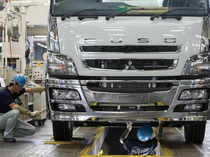
The maker of Bharat Benz truck registered a net loss of Rs 109 crore for FY-20 versus Rs 230 crore loss incurred in FY-19. The total revenue for the company slipped 30% to Rs 5,740 crore vs Rs 8,299 crore in FY-19.
Led by improved operating performance and higher responsibility given to India by the global office in terms of development, sourcing and exports, DICV announced close to $300 million investment in India in May of 2020 for the period of next three to five years
Raw material optimization and tight control on the overheads resulted in DICV improving operating profit margins by 264 basis points to 6.13% in FY20 compared with the previous fiscal, according to the company’s annual filing to the corporate affairs department.
The decline in raw material and other expenses was substantially lower than the drop in revenue. As a result, the operating profit rose 21% to Rs 352 crore. Consequently, it has been able to expand margins in challenging times. Operating margin of DICV is better than India’s largest truck maker Tata Motors, but slightly lower than Ashok Leyland’s.
The operating profit margins of CV division of the Tata Motors fell to 4.2% in FY20, a decline of 680 basis points, while Ashok Leyland dropped 410 basis points to 6.7%.
Reviewing FY-20, the director’s report stated the spread of COVID-19 across the globe and India has contributed to a significant decline and volatility in economic activity and financial markets.
The company management has considered the possible effects that may result from the pandemic relating to COVID-19 on the carrying amount of the assets of the Company.
“Based on the current indicators of future economic conditions, the management expects to recover the carrying amount of the assets,” added the statement.
With volumes coming back to positive territory in July to September quarter, Daimler India expects a sustained improvement in its operations.
Speaking on the recent demand recovery Satyakam Arya, MD & CEO Daimler India Commercial Vehicle, told ET that post-lockdown, demand is definitely moving up.
“Our sales for August showed double digit growth compared to 2019. For Q3 as a whole, our unit sales are up 5% compared to last year (2817 vs. 2672 as stated in the Q3 fact sheet). In overseas markets also, we are doing well,” he said.
At home, even as demand recovers, the company is expanding reach; by end of 2020, its network will exceed 250 touch-points. As for the overseas market, the company crossed its cumulative exports milestone of 35,000 units, 5,500 completely knocked units and 150 million parts exports.
To be sure, the company generated about 70% of its business by selling commercial vehicles, whereas 30% is generated from other business process management and outsourcing services.
“The early clearance of our BSIV stock before the April 1 deadline allowed the company’s dealers to focus on the sale of our new BSVI portfolio, which has helped in improvement of volumes in July to September,” Arya said.
DICV revenue in the previous fiscal was equivalent to 32% of Ashok Leyland and 15% of Tata Motors.
Given that the average realization of DICV is likely to be higher than the two leading CV makers as it only sells fully built trucks that fetch higher realization, the revenue market share of DICV could be higher than volume share.
In the previous fiscal year, Ashok Leyland had an average realization per vehicle of Rs 13.94 lakh.
According to the Federation of Automotive Dealers Association data of October 2020, DICV had a market share of 1.9% in the commercial vehicle market in India and it has witnessed 37 basis points improvement over the last year.
Download The Economic Times News App to get Daily Market Updates & Live Business News.
Subscribe to The Economic Times Prime and read the Economic Times ePaper Online.and Sensex Today.
Top Trending Stocks: SBI Share Price, Axis Bank Share Price, HDFC Bank Share Price, Infosys Share Price, Wipro Share Price, NTPC Share Price
Read More News on
Download The Economic Times News App to get Daily Market Updates & Live Business News.
Subscribe to The Economic Times Prime and read the Economic Times ePaper Online.and Sensex Today.
Top Trending Stocks: SBI Share Price, Axis Bank Share Price, HDFC Bank Share Price, Infosys Share Price, Wipro Share Price, NTPC Share Price















 Get Unlimited Access to The Economic Times
Get Unlimited Access to The Economic Times
